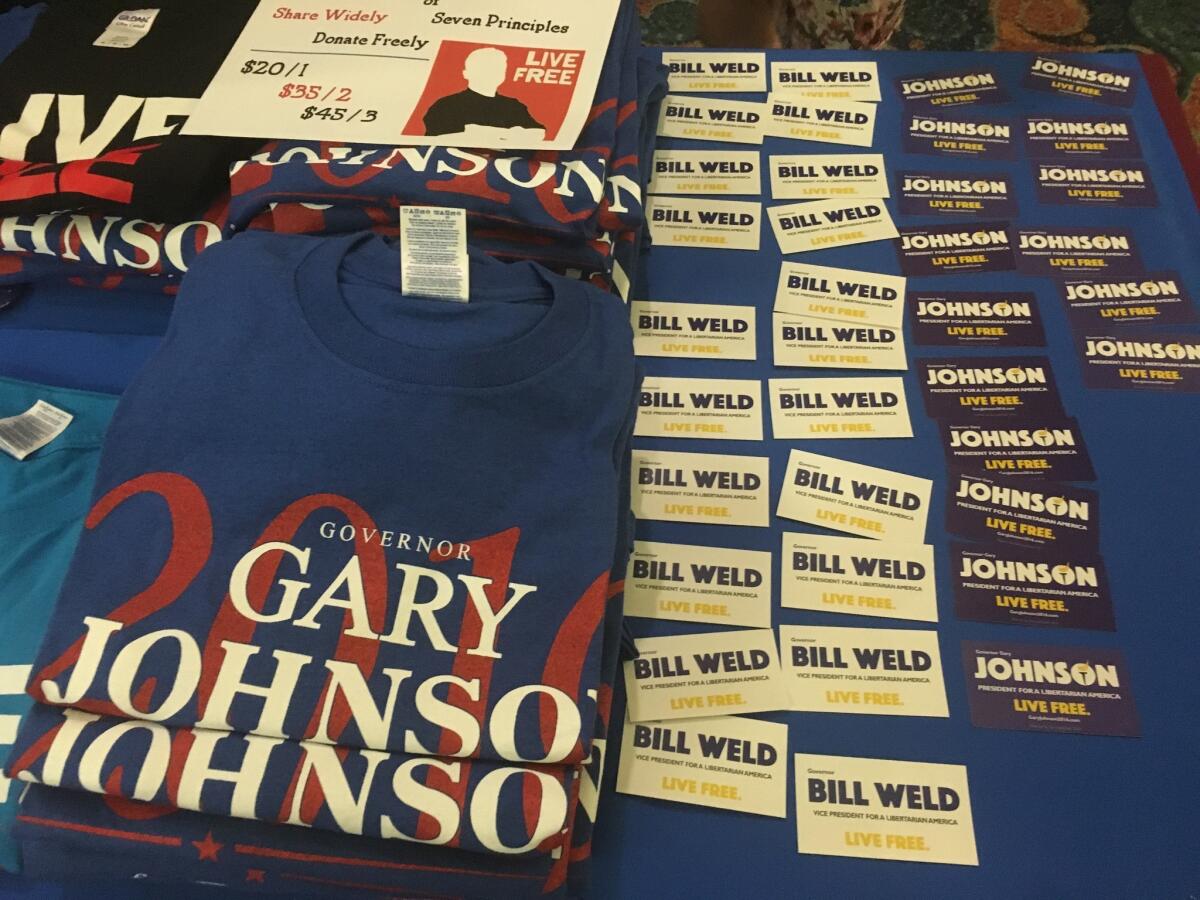As they convene in Florida, Libertarians hope to exploit frustration with main parties

- Share via
Reporting from Orlando, Fla. — Nicholas Sarwark, the chair of the Libertarian Party, likens his political movement to a cataclysmic chunk of space rock.
And he means that as a good thing.
Say you’re a fan of the Washington’s NFL franchise, as his wife is. “If you see the Cowboys and the Eagles play, you don’t care who wins,” he said in an interview Friday morning. “You kind of wish both could lose. Maybe a meteor could hit the stadium?”
“This is the opportunity for the American people to vote for the meteor,” he said.
Such is the role Libertarians are looking to play this election year, as large swaths of voters remain dismayed by the likely Republican and Democratic nominees. Sarwark, a mild-mannered former attorney who now operates his family-owned used car business in Phoenix, sees friendly terrain to blow up the established two-party system.
“This is the biggest thing happening in American politics right now,” said Sarwark, just before he kicked off the party’s convention in Orlando this weekend. “Because the two old parties are committed to self-destructing in front of us by nominating candidates who are the most hated in the modern era... we offer that option for people to vote for something that they want instead of something they’re afraid of.”
Libertarians--known for favoring small government and expansive civil liberties--are perhaps best positioned to take advantage of voter dissatisfaction with the Democratic and GOP candidates. The party has secured a place on the ballot in 32 states so far and Sarwark said he’s confident it will appear on the ballot in all 50 states in November.
First, though, the Libertarians must settle on a ticket. That’s the task of the approximately 1,000 delegates who will choose the party’s presidential and vice-presidential nominees.
There are 15 presidential candidates vying for the nomination, including former New Mexico Gov. Gary Johnson, who ran as the Libertarian candidate in 2012, and John McAfee, an antivirus software developer who had a recent series of high-profile legal disputes in Central America.
With an unprecedented spotlight on their proceedings, delegates are grappling with picking nominees who hew most closely to the party’s principles or could carry the broadest appeal.
“We’re constantly in tension. You can find somebody who’s completely awkward, has no resume but speaks beautiful Libertarian poetry and it would be great for the people they managed to touch. But very few people will they touch,” Sarwark said.
“On the flip side, you could find somebody with great stature,” he continued. “[Former GOP nominee] Mitt Romney could wander into the convention Sunday morning. He has a huge megaphone. Unfortunately, what he would be saying wouldn’t be Libertarian enough for most of the delegates.”
That debate has been particularly pointed after Johnson named former Republican Massachusetts Gov. Bill Weld as his running mate. Weld has held positions that run counter to Libertarian orthodoxy, such as backing gun-control measures.
“There has been a lot of sharp questioning of Gov. Weld... there are a lot of delegates that are very concerned,” Sarwark said.
The uneasiness, Sarwark said, dates to 2008, when the Libertarians selected former Rep. Bob Barr, a Republican from Georgia, as their presidential nominee. Barr was reticent to embrace the Libertarian mantle, and his performance in the election--around 500,000 votes--disappointed many activists.
“There’s a natural skepticism that we’re going to be saved by any particular big name,” Sarwark said. “Everybody’s happy that we have a former governor and then another former governor [Johnson and Weld] -- that we are attracting people of that stature. But the stature alone is not enough without convincing those delegates that person is Libertarian -- or Libertarian enough for the purposes of the 2016 election.”
More to Read
Sign up for Essential California
The most important California stories and recommendations in your inbox every morning.
You may occasionally receive promotional content from the Los Angeles Times.











